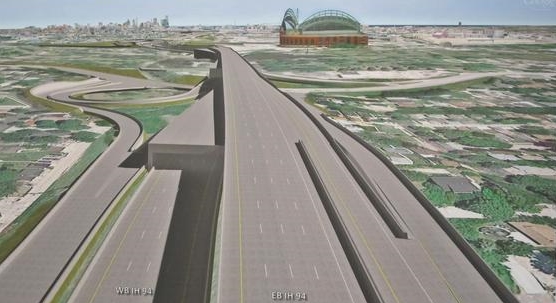Transportation Funding Problem Grows
The next state budget could face a $600 million transportation fund deficit.
Q. C’mon, not another column on the problem of paying for statewide highways, bridges and other transportation programs in the 2015-17 state budget. Why climb back on this soapbox?
A. The longer you consider the problem, the bigger it becomes. And, the last column on this issue was months ago; I looked it up. Assembly Speaker Robin Vos and the non-profit Wisconsin Taxpayers Alliance say it may be the most difficult issue in the 2015-17 budget that must be adopted next year.
Q. Why?
A. Start with just one figure: $991 million. That’s how much more state government borrowed to maintain transportation programs in the current two-year state budget, which ends June 30.
Current and future generations will be paying down that debt for decades. In the current two-year budget, interest and principal on debt totals $639.1 million; in the next two-year budget, interest and principal payments jump 13.7% – to $726.9 million.
This year, almost 20-cents out of every $1 you pay in transportation fees and taxes will go to service debt. That’s money that can’t maintain, repair or build highways.
Q. Why did our leaders in the Capitol borrow so much?
A. Gov. Scott Walker and Republicans who controlled the Legislature were not willing to consider raising the 30.9-cent per gallon state gas tax or related fees in the year before elections. The last increase in the gas tax was 2006; the last increase in the $75-per-vehicle registration fee was 2008.
The gas tax provides more than half of state transportation revenues.
Q. If the $75 annual registration fee on my car went up to $10, how much would that raise?
A. About $45 million per year.
A. No. Far from it. Estimates of the projected Transportation Fund deficit in the 2015-17 budget range from $224 million to more than $600 million.
Q. Why that huge range in the potential Transportation Fund deficit in 2015-17?
A. It depends what projects you include in 2015-17 spending projections. For example, the state Department of Transportation estimates that only continuing – and not finishing – work on the $1.7-billion Zoo Freeway and Hoan Bridge projects in Milwaukee will cost $957 over the next two years.
By comparison, this year all southeast Wisconsin freeway megaprojects were budgeted at $86 million.
And, legislators along the Madison-to-Illinois Interstate 90/39 corridor want it expanded from four to six lanes – a project estimated to cost $993 million.
Q. I hear candidates in the Nov. 4 elections say one solution is, “Let’s stop raiding the Transportation Fund.” Would that fix the 2015-17 deficit?
A. No. Transportation Fund “raids” have often occurred in the past. But on Nov. 4, Wisconsin voters will be asked to amend the state Constitution to prohibit future raids – a change expected to pass.
And there’s no raid in the current budget. Instead, the reverse is true: The state general fund is providing a one-time subsidy of $107.5 million to the Transportation Fund.
Q. Some candidates who want my vote on Nov. 4 also say they are interested in charging tolls on Wisconsin’s major highways. Is that another possible solution to the funding problem.
A. No, sorry. Under federal law, tolls can now only be charged on new lanes of major highways. Congress would have to change that law and Congress, well, can’t agree on lots of things – including how to pay its share of future transportation costs nationally. FYI: The 18.4-cent per gallon federal gax tax has not been raised since 1993.
Q. Any other funding options to keep transportation spending on track?
A. “Indexing” – annually adjusting the state gas tax for inflation – ended in 2006 and could be restored. A study panel recommended raising the fee to renew our drivers’ licenses. Also suggested was requiring a vehicle owner to report how many miles it was driven every year, so a small mileage-based surtax could be added to the $75 registration fee. Nobody is interested in a miles-traveled surtax, however.
Q. This is depressing. Do you promise to not do another column on this transportation funding mess?
A. How about this compromise: No column on this issue before Jan. 1?
The State of Politics
-
A Wisconsin Political Trivia Quiz
 Dec 15th, 2025 by Steven Walters
Dec 15th, 2025 by Steven Walters
-
The Fight Over Wisconsin’s House Districts
 Dec 8th, 2025 by Steven Walters
Dec 8th, 2025 by Steven Walters
-
The Battle Over On-Line Betting
 Nov 24th, 2025 by Steven Walters
Nov 24th, 2025 by Steven Walters























Maybe the DOT should scale back their project plans – drop the double-decked I-94 through Story Hill would be be a good start. Time for the DOT to live within their means….
As I read this they’re tearing up the nearest on and off ramps to me for the 2nd year in a row, presumably so they can gold plate them, because they were immaculate to begin with. How about fewer make-work projects as a cost-saving measure?
Pay now for good roads without crumbling bridges, potholes, tilted road slabs, or pay over $1,000 annually in car and truck damages for suspension and tire replacement. This does not include all the accidents, reduction in fuel mileage, and injuries and suffering from neglected infrastructure.
This government inaction is another form of demolition by neglect.
David, the highway budget is being used to widen and expand the roads we have, then hardly any money is being spent on actual maintenance.
Drivers in WI are still faced with some of the worst roads in the midwest, but they’re 4 lanes wide!
Hey I have a noble idea how about charging all USERS of our Roadways YES that include the good folks who love to Pedal their bikes on our roads…… All those improvements i.e. narrowing of our roads to include Bike Lanes sorry hardly ever see them used are very expensive to install/maintain and that’s before we even talk about what it’s does to traffic congestion. Let’s have some honest frank conversations about maybe $75 license fee on each bicycle in WI wouldn’t that go along way in helping WI Transportation Funding needs? Just Saying…….
What’s with the just saying….? Why is everyone using that phrase? Seems like another talk radio trend. Anyway, I’ve never seen so many people riding bikes. Why are they so expensive to install and maintain? Seems to me that a little reflector tape encourages bike ridership thus reducing total vehicle miles. That should save on road expansion and maintenance. It’s about time we increase the gasoline tax so those putting on the most miles pay the most in taxes. Leave bicyclists out of it. Just saying…..
Repairing the Brewer Stadium part of I-94 rather than expanding it plus totally rebuilding the Millet Park interchange would save $730 million. Drop some other mega-expensive freeway expansion projects – like the Beltline in Madison – and Wisconsin would have enough $$ to maintain our existing highways, roads, and streets – and invest in our growing needs for transit to boot.
Let’s not forget the role of the ill-fated Madison train in this whole discussion.
The main purpose of the Madison train was for Madison-Chicago trips (despite claims by talk radio that it was for Milwaukee-Madison trips). The construction costs of that extension would have been 100% covered by the Federal government; Washington even included about $160 million to cover any cost overruns.
Walker rejected the money saying Wisconsin couldn’t afford the operating subsidy–$7 million annually. Most people don’t know that this $7 million covered not just the Madison service but also covered the subsidy for 3 additional Chicago-Milwaukee trains. There would have been 10 daily Milwaukee-Chicago roundtrips (6 of which would have gone on to Madison).
Adding 3 trains to today’s 7 would have made the Hiawatha much more convenient. In the morning, there would have been less than one hour between trains (Chicago-bound trains would have left at 6:15 am, 7:12 am, and 8:00 am). There would be a late-night train leaving Chicago at 10:30 pm. All of this–not just the Madison service–was killed by Walker because he said $7 million per year was too much money.
Now his people propose spending $993 million to widen the main Madison-Chicago highway, I-90. That money would subsidize BOTH the new Madison-Chicago trains and the added Milwaukee-Chicago trains until the middle of the next Century.
Another point to make here is that after he rejected money for, among other things, expanded Chicago-Milwaukee train service, Walker’s administration now supports subsidizing that very expansion:
http://www.dot.wisconsin.gov/projects/rail/intercity/facts.htm